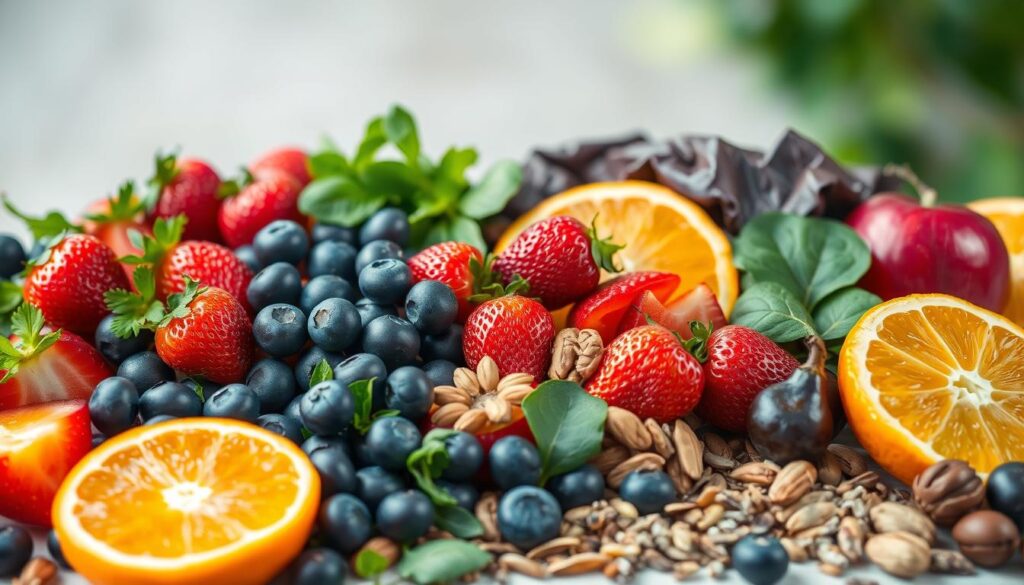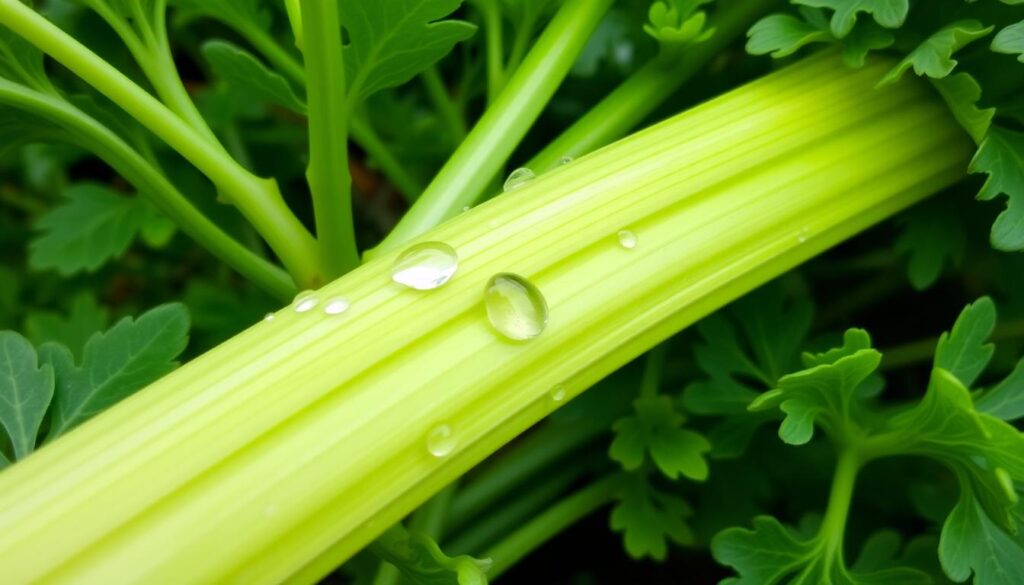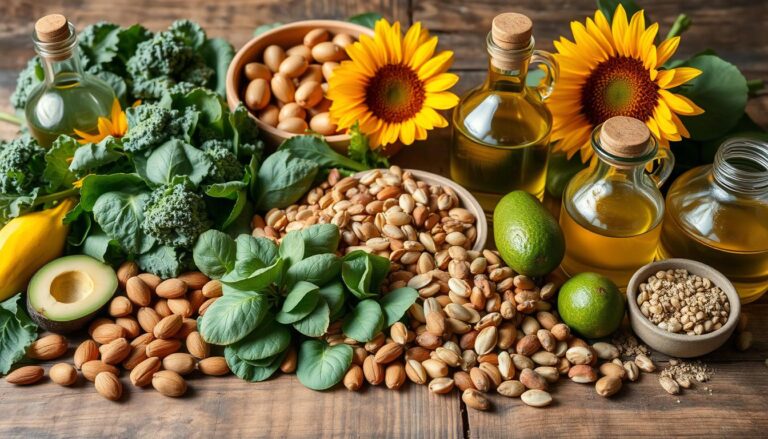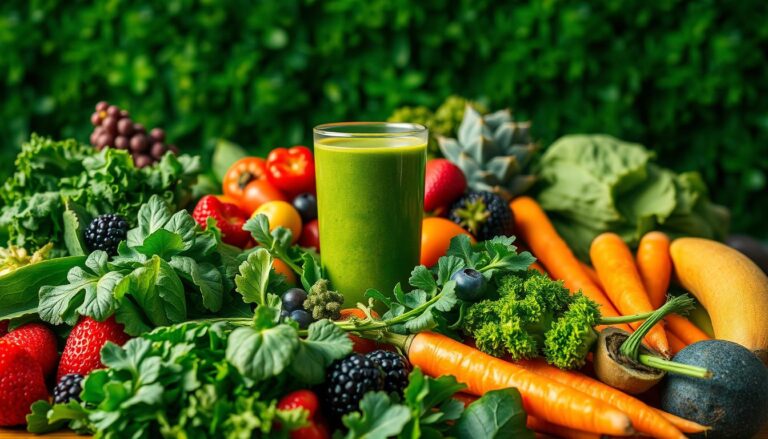Did you know some foods can boost your blood flow and heart health? Foods like berries, garlic, and beets are full of antioxidants and natural vasodilators. They can greatly improve your cardiovascular health. But how well do these foods work, and why are they so good for us?
Key Takeaways
- Several foods have been shown to help improve blood flow and support heart health, including garlic, onions, beets, berries, citrus fruits, and leafy greens.
- Poor circulation is a common problem caused by conditions like peripheral artery disease (PAD), diabetes, obesity, smoking, and Raynaud’s disease.
- Eating certain foods can help improve blood flow by promoting vasodilation, reducing inflammation, and supporting overall cardiovascular health.
- Antioxidant-rich and anti-inflammatory foods are particularly beneficial for boosting circulation and heart health.
- Consulting a healthcare professional is recommended to develop a comprehensive plan that incorporates these circulation-enhancing foods and lifestyle changes.
Introduction
Keeping blood flow and vein health in check is key for feeling good. Good circulation makes sure every cell gets the oxygen and nutrients it needs. It also helps get rid of waste. On the flip side, poor circulation can cause tiredness, numbness, and even serious problems like varicose veins or chronic venous insufficiency.
The foods we eat can really help with healthy blood flow and vein strength. Knowing how certain nutrients affect cardiovascular health and vein health helps us make better choices. This way, we can improve our overall health.

“Maintaining optimal blood flow and vein health is essential for overall well-being.”
The human body is amazing, with a vast network of blood vessels. These vessels work hard to get oxygen and nutrients to every cell. In a 70kg person, the body water is split into three parts: inside cells, between cells, and in the blood.
For nutrients and waste to move around, blood needs to get close to cells. This close connection is key for the body’s health. The tiny blood vessels, or microcirculation, are crucial for this process. They include arterioles, capillaries, and venules, with sizes ranging from 100-200 μm to as small as 5 μm for capillaries.
It’s vital to keep this circulatory system working well. By focusing on good circulation and eating foods that help it, we can support our heart and vein health. This is a proactive way to stay healthy.
Bioflavonoid-Rich Foods
Eating foods rich in bioflavonoids is a great way to keep your veins healthy. These plant compounds, found in colorful fruits and veggies, help strengthen veins. They make your veins strong and keep them working well.
Eating a variety of colorful veggies is key. Leafy greens, deep purples, bright reds, oranges, and yellows are all good. Bioflavonoids in these foods protect vein walls and boost blood flow. This helps prevent varicose veins and keeps veins healthy.
“Flavonoids have been associated with antioxidant effects, heart disease prevention, and diabetes prevention.”
Here are some top sources of bioflavonoids:
- Berries (blueberries, raspberries, strawberries, etc.)
- Citrus fruits (oranges, lemons, limes, grapefruits)
- Leafy greens (kale, spinach, arugula)
- Onions, tomatoes, and other colorful vegetables
- Tea (green, black, and oolong)
- Dark chocolate
- Soybeans and legumes
Adding these bioflavonoid-rich foods to your diet helps your veins stay healthy. By choosing vibrant, antioxidant-packed foods, you support vein health. This can help prevent varicose veins and keep your veins strong.

What foods increase blood flow the most?
Keeping your blood flowing well is key to staying healthy. Some foods are great at helping your blood move better. These foods include vasodilators and omega-3 fatty acids. They help your heart work better and your blood vessels open up more.
Top Circulation-Boosting Foods
- Beets: Beets are full of nitrates that turn into nitric oxide. This helps your blood vessels relax and can lower your blood pressure.
- Fatty Fish: Fish like salmon, tuna, and trout have omega-3 fatty acids. These fats reduce inflammation and keep your blood vessels flexible, improving blood flow.
- Leafy Greens: Spinach, kale, and other leafy greens have nitrates. These nitrates make your blood vessels wider, helping your blood flow better.
- Citrus Fruits: Oranges, grapefruits, and other citrus fruits are packed with vitamin C and flavonoids. These help strengthen your blood vessels and keep your circulation healthy.
- Berries: Strawberries, blueberries, and raspberries are full of antioxidants. These antioxidants help relax your blood vessels, making it easier for blood to flow.
- Turmeric: Turmeric contains curcumin, which improves blood vessel function. It also reduces inflammation and boosts blood flow.
- Nuts and Seeds: Almonds, walnuts, and other nuts and seeds are rich in healthy fats, fiber, and antioxidants. They support your heart health and help your blood vessels open up.
Eating these foods can make your heart healthier and improve blood flow. Adding them to your diet is a smart move for your overall health.
| Food | Circulation-Boosting Benefits |
|---|---|
| Beets | Rich in nitrates that convert to nitric oxide, helping to relax blood vessels and improve cardiovascular health. |
| Fatty Fish | Omega-3 fatty acids can reduce inflammation and maintain blood vessel elasticity, contributing to improved circulation. |
| Leafy Greens | Contain nitrates that dilate blood vessels, enhancing blood flow throughout the body. |
| Citrus Fruits | High in vitamin C and flavonoids, which can strengthen capillary walls and promote circulatory health. |
| Berries | Rich in antioxidants that help to relax blood vessels, facilitating better blood flow. |
| Turmeric | The curcumin in turmeric can enhance blood vessel function, reduce inflammation, and increase blood flow. |
| Nuts and Seeds | High in healthy fats, fiber, and antioxidants, supporting heart health and aiding in blood vessel dilation. |

Ginkgo Biloba
Ginkgo biloba is one of the oldest living trees, found in China. It has been used in traditional Chinese medicine for centuries. This plant is now recognized for improving blood flow and vascular health.
Studies have shown that ginkgo biloba boosts nitric oxide levels in the blood. Nitric oxide helps widen blood vessels, improving circulation. This can benefit many health areas, including brain function and heart health.
- A 20-year study found ginkgo biloba may slow cognitive decline.
- Trials have looked at its effects on blood flow in Raynaud’s and stroke patients.
- It may help with memory issues in dementia or Alzheimer’s.
- In the U.S., people use ginkgo supplements to boost memory and brain function.
While ginkgo biloba shows promise, the right dosage varies by condition. Always talk to a healthcare provider before starting supplements. They can advise on potential interactions or contraindications.
| Condition | Recommended Ginkgo Biloba Dosage |
|---|---|
| Dementia | 40 milligrams three times daily |
| Cognitive Enhancement in Healthy Individuals | 120-240 milligrams daily |
| Raynaud’s Phenomenon | 120-240 milligrams daily |
| Acute Ischemic Stroke | Varies based on clinical trials |
It’s crucial to know about ginkgo biloba’s side effects and interactions. Always consult a healthcare professional before adding it to your routine. With proper guidance, ginkgo biloba can be a valuable part of maintaining good blood flow and vascular health.

Celery and Vitamin K
Celery is a hidden gem for heart health. It’s packed with Vitamin K, key for blood clotting and flow. Vitamin K helps our blood carry oxygen and nutrients well.
Celery is also a natural diuretic. It helps flush out toxins and extra water. This can lower blood vessel inflammation. Plus, it’s low in calories but high in vitamins and minerals, great for a heart-healthy diet.
Celery has antioxidants and anti-inflammatory compounds. These help keep blood vessels healthy. Its high water content also supports hydration, vital for blood flow and circulation.
Adding more celery to your diet can boost your circulatory system. Its Vitamin K, diuretic, and anti-inflammatory benefits are key for better blood flow and heart health.

“Celery is an unsung hero in the realm of cardiovascular health, providing a unique blend of Vitamin K, diuretic properties, and anti-inflammatory benefits to support optimal blood flow and circulation.”
Dark Chocolate: The Sweet Treat for Your Veins
Dark chocolate is known for its rich taste, but it’s more than just a treat. It’s also good for your blood vessels. The flavanols in cocoa solids boost blood flow and strengthen blood vessel walls.
Dark chocolate supports healthy blood flow, keeping your veins strong. Its antioxidants fight inflammation, which is good for your heart. Studies show it can lower blood pressure and reduce heart disease risk. It even improves brain function and mood.
Choose dark chocolate with at least 70% cacao for more flavanols. Brands like Ghirardelli, Mast, Taza, and Valrhona are good choices. They have less heavy metals. Eat 20-30 grams a day for the best benefits.





